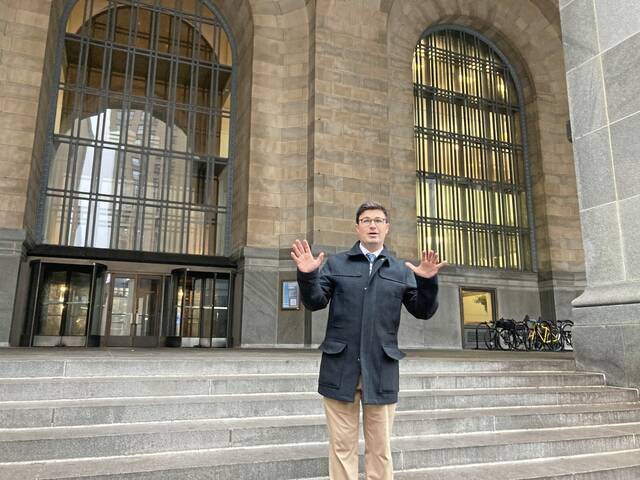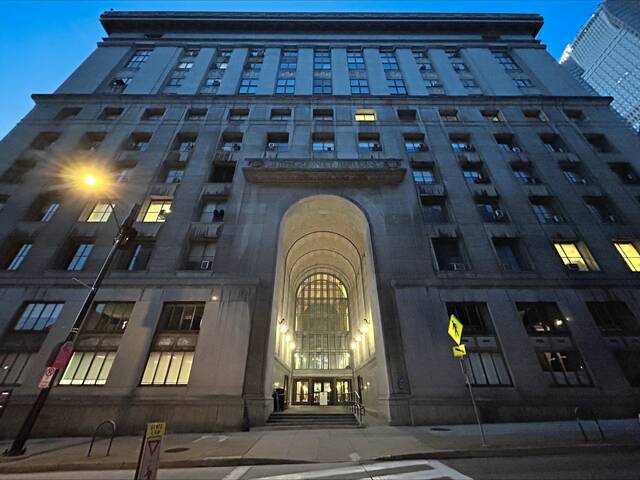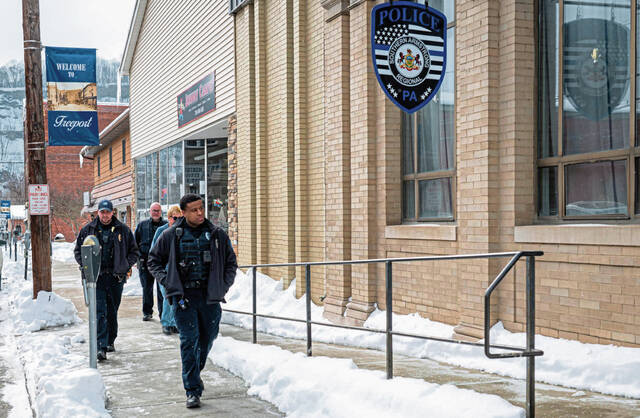Allegheny County Executive Sara Innamorato on Tuesday defended her proposed property tax increase as necessary to combat the county’s ballooning budget deficit, pay for public safety and infrastructure repairs, and address homelessness.
Speaking at a news conference in Downtown Pittsburgh, Innamorato also challenged County Council to work with her on identifying places to cut from the budget if they weren’t willing to support a tax hike.
This month, Innamorato pitched a 2.2-mill property tax increase for her $3.1 billion budget proposal for 2025. That would translate to a 46.5% property tax hike.
Millage rates would go up to 6.93 mills from 4.73 mills, adding $182 per year to the tax bill for a county’s median homeowner.
One mill equals $1 in taxes for every $1,000 of assessed property value. County property taxes have not been increased since 2012.
Innamorato’s plan drew immediate pushback from some council members, including those within her own party.
Council President Pat Catena, D-Carnegie, said last week the proposal as written was likely dead and didn’t have the 10 votes needed to pass.
‘A lot of rhetoric’
Innamorato, a Democrat from Lawrenceville, said her staff has struggled for months to find savings without making draconian cuts to essential services.
Increased costs for health care, road paving and other wages have all been driven up by inflation, and property taxes are not adjusted to inflation automatically.
She said that if council can find the cuts, she would like to see them.
“What I have heard from council is a lot of rhetoric and not a lot of proposed solutions. So if they are interested in not moving forward with the 2.2 mills, they are going to have to tell us specifically what to cut,” Innamorato told reporters at the Allegheny County Courthouse.
Innamorato wants to know specifically what programs council proposes to cut. She said county government already runs light and there is not much fat to trim.
“Whether it is not investing in our child care, whether it is reducing the amount of money we are spending at the 911 center, whether it is cutting our county police or any of the row offices, they have to propose what those cuts look like,” Innamorato said.
When reached by phone, Catena reiterated that a 2.2-mill increase is just too high of a burden to place on county taxpayers. He said there is a possibility of broad-based cuts.
“When you are dealing with this large of an increase, there are going to need some cuts across the board,” Catena said. “I know no one wants to hear that.”
Council’s budget office and the executive’s budget department have yet to meet, said Catena, but he added that he expects they will get together in the near future.
He said he wants council to work cooperatively with Innamorato and believes that will help avoid severe cuts.
Catena acknowledged the county will need to face some form of tax increase to address the budget deficit.
“I am hoping we can work with the county to find places to possibly cut and other austerity measures,” Catena said.
The cost of human services
The county has been running budget deficits since 2021. That deficit is set to grow to $133 million by 2025 if not addressed with a tax increase or budget cuts.
Innamorato said the county has been filling those gaps with federal pandemic aid and by drawing from the county’s reserve fund. Federal pandemic aid expires after this year.
Allegheny County is not the only Western Pennsylvania county facing significant budget issues because of declining federal and local revenue sources.
Last year, Westmoreland County raised its property taxes by 32.5%. Republicans control Westmoreland County government.
Innamorato said Allegheny County owes an explanation to residents about why taxes need to be raised, acknowledging the average taxpayer is not studying government finance and is instead worried about the cost of groceries, prescription drugs and gas.
But she said the county provides essential services for its 1.2 million residents, highlighting three areas where she feels investment is necessary in the face of a potential tax increase: the county’s emergency call center and law enforcement’s communication system; the county’s 18 structurally deficient bridges; and ways to address homelessness, provide affordable child care and deliver senior care.
Innamorato acknowledged the Department of Human Services — which controls the county’s homeless shelters and funds organizations addressing child care, mental health and senior care — is the county’s most expensive item in the budget. But she said that’s largely to ensure the county is taking advantage of state and federal funding matches.
She noted that for every $1 the county invests in human services, it gets $5 from outside sources.
“Now is not the time to cut investments in human services,” Innamorato said.
Homelessness in Allegheny County has been on the rise, and Innamorato said her plan to tackle the issue has made progress.
In June, she announced an initiative to bring 500 new low-income housing units online in 500 days to address overcrowding at the county’s homeless shelters.
She said Tuesday that the county has added 100 new units in the first 100 days of the plan.
Economic development a must
A recent $80 million investment in a new communications system for law enforcement and improvements to the county’s 911 call center should also be off the table for cuts, Innamorato said.
She said the 911 center costs would have been covered by the state had the Legislature accepted Gov. Josh Shapiro’s proposed budget.
But those funds were stripped out by the Legislature, whose control is divided between Democrats and Republicans.
“The county has to pick up that bill so that we can continue to provide quality and responsive 911 services,” Innamorato said. “The last thing we want to happen is you call 911 and you get placed on hold. I have been to states where that has happened, and it is terrible.”
She also said the county must continue to invest in economic development to boost local growth. That, in turn, could help improve county revenue, which has been on a downward trajectory.
Innamorato wants to avoid cuts to the Department of Economic Development.
She said direct investments in the department are paying dividends — like a recent $1 million county expenditure that helped secure $87 million in federal investment for a clean energy storage manufacturing facility near Pittsburgh International Airport.
“Our region has been the slowest growing post-pandemic, and we can’t be spectators in our own economic future,” she said.
A final budget must be passed by Dec. 6, according to Allegheny County’s charter.








